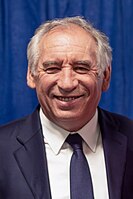Bayrou government
Bayrou government | |
|---|---|
| 46th Government of French Fifth Republic | |
 | |
| Date formed | 13 December 2024 |
| People and organisations | |
| President of the Republic | Emmanuel Macron |
| Prime Minister | François Bayrou |
| No. of ministers | 35[a] |
| Member parties | |
| Status in legislature |
|
| History | |
| Election | 2024 French legislative election |
| Predecessor | Barnier government |
The Bayrou government (French: gouvernement Bayrou) is the forty-sixth and incumbent government of France. It was formed in December 2024 after President Emmanuel Macron appointed François Bayrou as Prime Minister on 13 December, replacing caretaker Michel Barnier (who had been removed from office by a motion of no-confidence).
François Bayrou is the fourth prime minister to hold the office in a single year, the most in the history of the Fifth Republic.
The government includes members of Emmanuel Macron's coalition, Ensemble, as well as The Republicans; despite its minority status, it survived a vote of no confidence on 16 January 2025 thanks to abstentions from the National Rally and the Socialist Party.
Formation
[edit]Background
[edit]Barnier Government
[edit]Following gains by opposition parties in the legislative elections called by President Emmanuel Macron in the summer of 2024, Gabriel Attal resigned. Macron initially refused his resignation but accepted it on 16 July.[1] On 5 September, Barnier was appointed as prime minister by Macron.[2]
Barnier was faced with a National Assembly divided nearly evenly into three blocs: the left-wing New Popular Front with a plurality of seats, Macron's centrist to centre-right Ensemble, and the far-right National Rally.[2][3]
On 2 December 2024, Barnier invoked article 49.3 of the French Constitution to adopt the Social Security budget for 2025 without submitting it to a parliamentary vote[4] , prompting both the New Popular Front and the National Rally to file motions of no confidence against his government.[5][6] On 4 December, three months into his tenure, the Barnier government collapsed by a vote of no confidence in National Assembly in a 331–244 vote.[7]
Searching for a new Prime Minister
[edit]Prime Minister Michel Barnier then presented his government's resignation in the evening to the President of the Republic, who accepted it.[8] He ensured that current affairs were handled with the government pending the formation of a new government from 6 to 13 December.
After the resignation of the Barnier government, negotiations took place between the President of the Republic and the various parliamentary groups, with the exception of the LFI, RN and UDR. These discussions led Olivier Faure, First Secretary of the Socialist Party, to consider a non-censorship agreement on the condition that the Prime Minister be left-wing.
Over the course of a week, various candidates were considered for the position of Prime Minister, including Bernard Cazeneuve, Sebastien Lecornu, François Villeroy de Galhau, François Baroin, Roland Lescure and François Bayrou.
Bayrou's appointment as Prime Minister
[edit]
After being rejected the day before on 12 December, Bayrou met the President at the Élysée the following morning. At the end of a long, heated discussion (with fears of a break with the MoDem), Emmanuel Macron finally appointed him Prime Minister on 13 December 2024.[9] At 73 years old, he is the second oldest serving Prime Minister, after Michel Barnier, to come to power. He is also considered a loyal supporter of President Macron,[10] whom he supported in 2017 presidential election.[11] He was nominated Minister of State and Justice in the first Philippe Government, between May and June 2017.
François Bayrou was supported by the Macronist bloc, while being rejected by La France Insoumise, while the other left-wing parties and the far right were awaiting the measures taken by the Prime Minister.
Bayrou, in his speech, recalled the importance of social justice, republicanism, national reconciliation, the need to overcome a serious crisis that is ravaging Europe and France, and thanked Barnier for his work as Prime Minister. The case of corruption for embezzlement of European funds, of which Bayrou was acquitted in autumn 2023 due to lack of evidence, was widely reported in the media.
The Socialist Party, in a letter to the new Prime Minister, asked him to give up applying article 49.3 of the Constitution in exchange for no censure, announced that socialists members "will not participate in government and will therefore remain in opposition in Parliament", and blamed the President for "aggravating the political crisis".[12]
Composition
[edit]Ministers
[edit]Deputy Ministers
[edit]Notes
[edit]- ^ Does not include the Prime Minister.
References
[edit]- ^ "DIRECT. Législatives : Gérald Darmanin appelle le camp présidentiel à "travailler avec LR"". Le Parisien. 16 July 2024. Archived from the original on 6 September 2024. Retrieved 16 July 2024.
- ^ a b "Live blog: Macron names Michel Barnier new prime minister". France24. 5 September 2024. Retrieved 5 September 2024.
- ^ "Macron's Choice of French Premier Shows His Ambitions Unraveling". Bloomberg.com. 5 September 2024. Archived from the original on 6 September 2024. Retrieved 5 September 2024.
- ^ "Budget de la sécurité sociale: Michel Barnier active le 49.3 et s'expose à une motion de censure". Ouest-France.fr (in French). 2 December 2024. Retrieved 4 December 2024.
- ^ "DIRECT. Motion de censure: Michel Barnier joue sa survie à l'Assemblée nationale". L'Express (in French). 4 December 2024. Retrieved 4 December 2024.
- ^ Willsher, Kim (2 December 2024). "French government faces no-confidence vote on Wednesday". The Guardian. ISSN 0261-3077. Retrieved 4 December 2024.
- ^ "En direct: 331 députés votent la censure du gouvernement de Michel Barnier, le premier ministre va remettre sa démission à Emmanuel Macron". Le Monde.fr (in French). Retrieved 4 December 2024.
- ^ "Le Premier ministre a remis ce jour la démission de son Gouvernement au Président de la République qui en a pris acte". elysee.fr (in French). 2024-12-05. Retrieved 2024-12-13.
- ^ "Le Président de la République a nommé M. François Bayrou Premier ministre, et l'a chargé de former un Gouvernement". elysee.fr (in French). 2024-12-13. Retrieved 2024-12-13.
- ^ Grégoire Poussielgue (2024-12-13). "François Bayrou nommé Premier ministre". Les Echos. Retrieved 2024-12-13.
- ^ "Présidentielle : Bayrou et Macron, une alliance sous conditions". Le Monde. Agence France-Presse. 22 February 2017. Archived from the original on 23 February 2017. Retrieved 23 February 2017.
- ^ "François Bayrou à Matignon: "pas de censure a priori" pour le RN; le PS demande au nouveau premier ministre de renoncer au 49.3... les premières réactions politiques". Le Monde. 13 December 2024.

